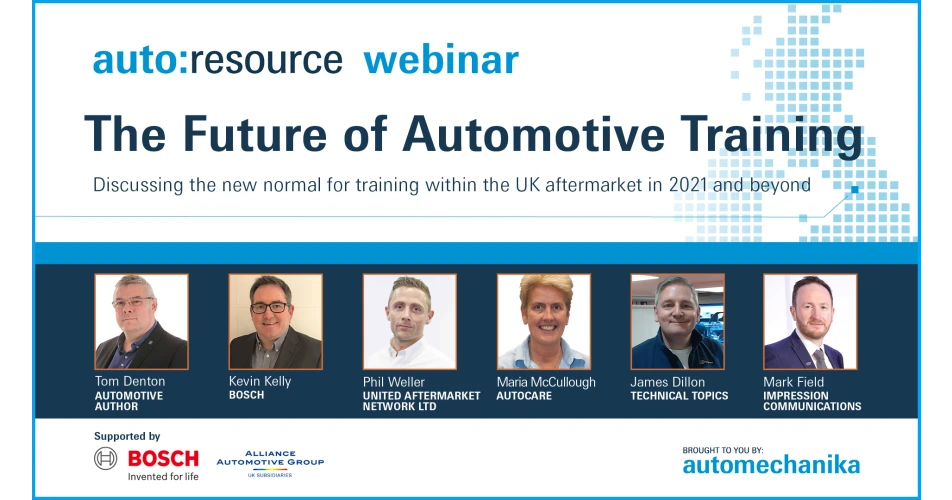The latest in the auto:resource Automotive Aftermarket Webinar Series, from Automechanika Birmingham, focused on the Future of Automotive Training and the key changes that the sector can expect.
A panel of industry experts led the conversation, including automotive author, Tom Denton; Maria McCullough, AutoCare Garage Network Manager; Phill Weller, Network Manager for United Garage Services GROUPAUTO; Kevin Kelly, Bosch Sales Director UK & Ireland; and James Dillon, Independent Trainer for Technical Topics.
All described how training had gone online in 2020 as a response the pandemic. This offered a useful means of communication with mostly short, but effective sessions. All concluded that his was a good way to get people engaged with training and create new interest, but drawbacks included the lack of hands on practical sessions and the absence of instant feedback and two way dialogue. It was also pointed out that COVID-19 restriction has severely limited apprentice training during the year.
The panel then discuss how prepared aftermarket businesses felt they were for the future in regards to training and which particular areas required the greatest training input. Unsurprisingly electrical vehicle training was top of the list for a combination of business development, safety and legal reasons. Many also stressed that ADAS training should now be a priority for many garages, while the need to maintain diagnostic training was as vital as ever.
The importance of ongoing training was also discussed not just in the context of solving arising issues in the workshop, but as part of overall business development. Tom Denton stressed that good quality training should be considered as an investment rather than a cost for a business, while other panel members discussed the importance of making sure training is in line with a clear business development plans, which may involve more business specialisation and investment in new equipment. It was also pointed out that as well a technical training, business training was equally important.
James Dillon made the very valid point that in an increasingly competitive employment market, training can play a key role in staff retention and recruitment. He also added that training needs to be seen as an ongoing process, commenting, “No one is a fully trained technician and therefore continual professional development is essential.”
Looking to the future, the consensus was, that when restrictions are lifted the market would adopt a blended training approach combining online and practical training, with participants encouraged to pre-prepare for training courses to ensure they get the most out of them.
The general conclusion was that despite the problems created by COVID-19 the aftermarket had adapted well to meet its training needs. However, the need for effective training remains more important than ever and aftermarket companies need to make training a key element of their business planning.
